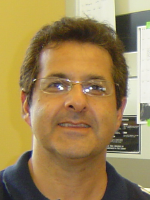NanoBioTechnology Commercialization
Nanobiotechnology is poised to shape the sustainability of industries and wealth of nations, and transform economies and societies on a global scale. The global market for nanomedicine was $250 billion in 2014 and it is expected to reach $550 billion by 2020. Nanotechnology is the solution to detection, diagnosis, and treatment of many diseases as biological processes and cellular mechanisms work at the nanoscale. Translation of nanoscale discoveries from the laboratory to the market promises new diagnostic tools and robotic devices, drug targeting systems, gene therapy platforms, biomaterials, regenerative tissue constructs, and personalized medicine. Although most scientists recognize the molecular scale complexity of their discoveries and innovations, they have less appreciation for the expertise required to develop their biotechnologies into a marketable product. This presentation highlights recent advances and challenges in commercialization of nanotechnologies in the healthcare market from innovation to the protection of intellectual property, financing of research and development, standardization for quality control, regulatory process for clinical evaluation, product safety and environmental issues, challenges in evaluation of toxicity and regulation of nanomaterials, and business models for commercialization of nanotechnologies in the healthcare market. This presentation will cover fundamental concepts and risks involved in commercialization of diagnostic devices, drug and gene delivery systems, and constructs for tissue regeneration.
Biography
 Dr. Jabbari is a Tenured Full Professor of Chemical and Biomedical Engineering and the Director of Biomaterials, Tissue Engineering and Drug Delivery at the University of South Carolina. He earned his Ph.D. from Purdue University in Chemical Engineering. He began his independent career as an Assistant Professor in the Departments of Biomedical Engineering and Orthopedic Research at Mayo Clinic upon completion of his post-doctoral training at Monsanto and Rice University. Jabbari’s research is focused on engineering 3D multi-cellular co-culture systems and the effect of spatiotemporal delivery of growth factors and physico-mechanical factors in the microenvironment on function and fate of stem cells for applications in skeletal tissue regeneration and cancer stem cell therapy. He received the Berton Rahn Award from the AO Foundation in 2012 and the Stephen Milam Award from the Oral and Maxillofacial Surgery Foundation in 2008. He was elected to the College of Fellows of the American Institute for Medical and Biological Engineering (AIMBE) in 2013. He has published >250 books, book chapters, refereed journal articles (107 peer-reviewed), and conference proceedings, and presented >260 seminars at national and international conferences (67 plenary, keynote, and invited seminars). He currently serves as the Technical Chair as well as the Programming Chair for Bionanotechnology theme of the annual conference of Engineering in Medicine & Biology Society (IEE-EMBS). He serves as the Academic Editor for PLOS ONE, Editor of International Journal of Biomaterials, and North America Editor of Journal of Biomaterials and Tissue Engineering. Dr. Jabbari has mentored >130 visiting scholars, medical residents, post-doctoral scientists, and engineering students. He is a member of numerous scientific organizations including AIChE, BMES, ACS, EMBS, SFB, TERMIS, MRS, ACS, and AACR.
Dr. Jabbari is a Tenured Full Professor of Chemical and Biomedical Engineering and the Director of Biomaterials, Tissue Engineering and Drug Delivery at the University of South Carolina. He earned his Ph.D. from Purdue University in Chemical Engineering. He began his independent career as an Assistant Professor in the Departments of Biomedical Engineering and Orthopedic Research at Mayo Clinic upon completion of his post-doctoral training at Monsanto and Rice University. Jabbari’s research is focused on engineering 3D multi-cellular co-culture systems and the effect of spatiotemporal delivery of growth factors and physico-mechanical factors in the microenvironment on function and fate of stem cells for applications in skeletal tissue regeneration and cancer stem cell therapy. He received the Berton Rahn Award from the AO Foundation in 2012 and the Stephen Milam Award from the Oral and Maxillofacial Surgery Foundation in 2008. He was elected to the College of Fellows of the American Institute for Medical and Biological Engineering (AIMBE) in 2013. He has published >250 books, book chapters, refereed journal articles (107 peer-reviewed), and conference proceedings, and presented >260 seminars at national and international conferences (67 plenary, keynote, and invited seminars). He currently serves as the Technical Chair as well as the Programming Chair for Bionanotechnology theme of the annual conference of Engineering in Medicine & Biology Society (IEE-EMBS). He serves as the Academic Editor for PLOS ONE, Editor of International Journal of Biomaterials, and North America Editor of Journal of Biomaterials and Tissue Engineering. Dr. Jabbari has mentored >130 visiting scholars, medical residents, post-doctoral scientists, and engineering students. He is a member of numerous scientific organizations including AIChE, BMES, ACS, EMBS, SFB, TERMIS, MRS, ACS, and AACR.
